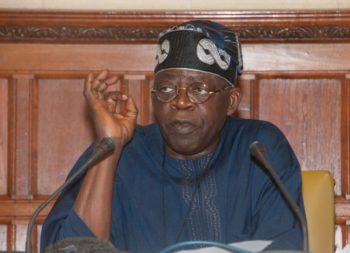Former Governor of Lagos State and National Leader of the ruling All Progressives Congress (APC), Asiwaju Bola Tinubu, Wednesday, took a swipe at the Federal Government’s economic policy, asking for immediate review to save the country of sliding into depression.
This was even as he warned against what he called “lack of true federalism”, saying, “Unjust allocation of resources makes a fertile ground for extremism.”
Senator Tinubu, who insisted that the current economic policy of the government had not done the country any good, pointedly told President Muhammadu Buhari to realign trade policy with the country’s need to create a meaningful industrial base and more potent agricultural sector.
“We can no longer allow cheap imports to preclude the development of industries and sectors strategic to our enduring economic future, “he opined.
Speaking at the National Defence College, Abuja, where he featured as a guest speaker, on a public lecture with the titled:” Strategic Leadership: My Political Experience’ Tinubu took a swipe at the President’s monetary policy, arguing that, as a strategic partner in the formation of the government, it was incumbent on the leaders to “speak truth to power.”
At the occasion where he also donated the sum of N10 million to the National Defence College as part of his contribution to enriching the strategic development of the college, Tinubu said though the government had made appreciable achievements in the security sector, especially the defeat of Boko Haram insurgency in the North-East , it was necessary “to move closer to the overarching vision.”
“We now have to shift primary focus to the economic front.
“The desired economic restructuring will require a change in economic mindset and strategy. We must avoid the nostrums of mainstream orthodoxy that say government deficits are always bad,” he warned.
“In the situation we face, deficit spending is essential to bolster aggregate demand and direct funds to projects that build infrastructure and bolster employment.
“We must better harmonize monetary policy with fiscal policy. It undercuts our goals if monetary policy is unduly tight at a time fiscal policy begets deficit spending.
“We must also realign trade policy with our need to create a meaningful industrial base and more potent agricultural sector. We can no longer allow cheap imports to preclude the development of industries and sectors strategic to our enduring economic future,” he said.
